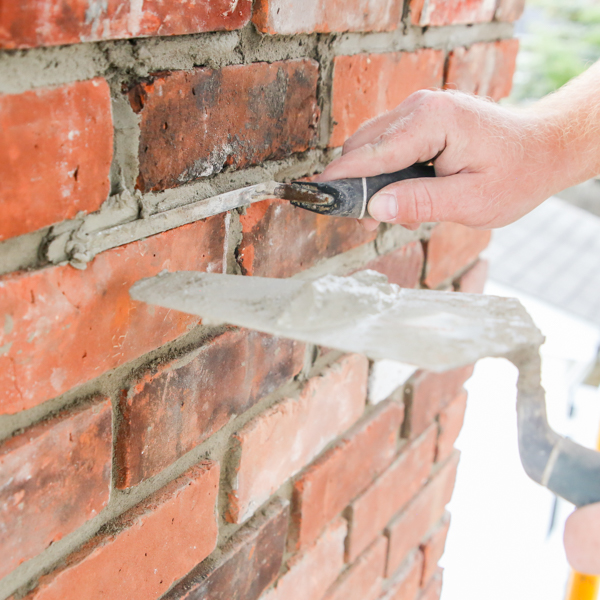Unlocking the Secrets of Lasting Stonework Building Practices for Eco-Friendly Buildings
In the realm of modern-day building, the quest of lasting practices has actually ended up being extremely important. Among the myriad methods to environmentally friendly structure, sustainable stonework building sticks out as a reliable and long lasting method that holds a riches of untapped capacity. From the choice of products to ingenious building and construction methods, the secrets to attaining sustainability within stonework building are complex and interesting. By checking out the benefits, materials, techniques, and future trends of lasting masonry, a deeper understanding of how these techniques can shape the future of green structures emerges.
Benefits of Sustainable Masonry Construction
Accepting lasting masonry building and construction methods not just decreases environmental effect yet additionally provides long-term financial advantages to builders and neighborhoods. By using materials like recycled blocks, blocks, and rocks, builders can substantially decrease the carbon footprint of their projects while advertising resource efficiency. Furthermore, lasting stonework building and construction techniques, such as correct insulation and thermal mass residential or commercial properties, can improve energy effectiveness within structures, causing decreased operational prices in time.
Furthermore, the longevity and resilience of masonry structures contribute to lasting economic benefits. Buildings built making use of lasting stonework practices usually require much less repair and maintenance, translating to cost savings for home builders and residential or commercial property owners. The durability of stonework products likewise makes certain that structures stay secure and safe, lowering the demand for constant remodellings or substitutes.
Eco-Friendly Stonework Products
Using environmentally friendly masonry products is an essential action in the direction of improving the sustainability of building and construction practices and minimizing ecological effect while taking full advantage of long-term economic advantages. Lasting stonework products are sourced, generated, and utilized in a manner that reduces overall environmental effect. Products such as recycled blocks, redeemed rock, and sustainable concrete blocks are coming to be increasingly preferred choices for eco-conscious building contractors. Recycled blocks, as an example, not only draw away waste from land fills yet likewise require less energy to generate compared to brand-new bricks. Reclaimed stone uses a special aesthetic appeal while lowering the need for brand-new quarrying. Sustainable concrete obstructs include recycled accumulations and may feature enhanced insulation residential properties, contributing to energy efficiency in structures.
Additionally, natural products like adobe, rammed planet, and straw bales supply exceptional thermal mass residential properties, reducing the requirement for heating and cooling down energy. These materials are often locally available, promoting local economies and reducing transportation-related carbon discharges. By choosing environmentally friendly stonework products, building jobs can significantly decrease their ecological impact and add to the production of much healthier, more lasting developed settings.
Energy-Efficient Stonework Strategies
Energy efficiency plays a crucial duty in improving the sustainability of masonry building methods. By applying energy-efficient stonework methods, building contractors can substantially minimize the general energy consumption of a structure, resulting in lower functional costs and a smaller next ecological footprint. One crucial energy-efficient stonework method is the use of thermal mass, which involves including thick materials like concrete or brick into the building's framework to take in and save warm. This helps control interior temperature levels, minimizing the requirement for mechanical home heating and cooling systems.

Technologies in Lasting Masonry
Recent advancements in lasting stonework methods have caused cutting-edge methods that are improving the building industry. One such innovation is the growth of self-healing concrete, which utilizes germs embedded within the concrete to recover cracks autonomously. This development not only reduces upkeep prices but additionally boosts the durability of stonework structures, adding to their sustainability.
One more noteworthy advancement is the use of recycled accumulations in masonry building - masonry contractor. By incorporating products such as crushed ceramic waste or recycled glass right into concrete blends, building contractors can decrease the environmental effect of building and construction projects while keeping structural stability. This practice not only draws away waste from landfills however additionally saves all-natural resources, making it an essential development in lasting masonry building
Furthermore, the assimilation of electronic design tools, such as Building Info Modeling (BIM), is revolutionizing the method masonry frameworks are intended and constructed. BIM enables more specific useful link calculations, decreased material wastage, and enhanced power effectiveness, ultimately causing more sustainable building practices. These technologies collectively represent an appealing future for lasting stonework construction in the era of eco-friendly structures.
Future Trends in Masonry Sustainability
With the ingenious strides made in lasting stonework techniques, the future trends in stonework sustainability are poised to additional transform the building sector. One of the essential trends shaping the future of stonework sustainability is the boosted combination of innovation. Innovations such as Building Information Modeling (BIM) and virtual fact simulations are being used to enhance masonry construction processes, causing minimized material waste and improved energy effectiveness in buildings.
Additionally, the development of unique lasting products is readied to play a considerable duty in improving the eco-friendliness of masonry construction. masonry contractor. Technologies like self-healing concrete, recycled aggregates, and bio-based binders are getting grip for their capability to decrease environmental impact while keeping structural stability

Final Thought
In verdict, lasting masonry construction practices provide various benefits for environmentally friendly structures. By making use of eco-friendly materials and energy-efficient methods, stonework can add to an extra sustainable constructed atmosphere. Innovations in sustainable stonework are continuously being developed to further boost the ecological performance of buildings. Looking in the direction of the future, the fad of masonry sustainability is expected to grow, leading to more environmentally friendly and energy-efficient construction practices in the years ahead.
Comments on “Top-notch Roofing Contractor Services for Your Home”